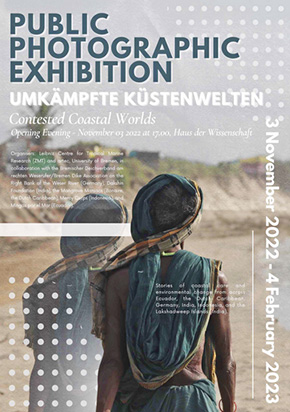27/10/2022 | On Thursday, November 3, the Haus der Wissenschaft will open the photo exhibition "Contested Coastal Worlds - Care and Conviviality in Coastal Life", to which we cordially invite you. The exhibition was co-curated by Dr. Rapti Siriwardane-de Zoysa from the Leibniz Centre for Tropical Marine Research and Dr. Johannes Herbeck form the Sustainability Research Center (artec), in partnership with the Bremischer Deichverband am rechten Weserufer, Mercy Corps (Indonesia), Dakshin Foundation (India), Mingas por el Mar (Ecuador) und Mangrove Maniacs (Bonaire). The exhibition will be on display until February 4, 2023.
Opening: November 3, 5 pm
The words of welcome will be spoken by:
- Dr. Peter Ritzenhoff, Vorstandsmitglied Haus der Wissenschaft
- Dr. Johannes Herbeck, Forschungszentrum Nachhaltigkeit (artec)
- Dr. Rapti Siriwardane-de Zoysa, Leibniz-Zentrum für Marine Tropenforschung
Duration: November 4, 2022 - February 4, 2023
Venue: Haus der Wissenschaft, Sandstraße 4/5, Bremen
Admission: The entrance is free!
The photographic exhibition invites you into the lifeworlds of people committed to progressive coastal change and their reports about everyday struggles, hopes and aspirations. Immerse yourself in stories of coastal care and environmental change from across Ecuador, the Dutch Caribbean, Germany, India, Indonesia, and the Lakshadweep Islands.
Coasts act as dynamic interfaces between land and sea. They are highly complex and fragile spaces and face multiple challenges across the world. These interrelated issues include rising sea levels, ocean warming, the increase in marine plastic waste, erosion by ocean currents, surf and wind, and the increase in hazard situations due to storm surges and tsunamis. At the same time, coasts serve as crucial sites for infrastructure such as ports and industrial facilities, as well as spaces for popular recreational and residential areas with high demand from tourism and the construction sector.
For centuries, humans have influenced the form and function of coasts, with impacts on ecosystems, hydrology, and even the course of coastal currents. In densely built and populated coastal areas, for example in Europe and Southeast Asia, diverse values and socio-economic requirements of what a "good" coast ought to constitute, sometimes clashes irreconcilably. Yet people around the world remain committed to regenerating their local seacoast spaces, and in transforming them into thriving ecosystems and habitable spaces for living.
This exhibition invites you to step into the lifeworlds of such people and their self-driven responsibility in working towards progressive coastal change. From a first-person pespective and through their own eyes via their own photgraphic images, these panels relay stories about everyday struggles, hopes and aspirations. For the narrators, these coastal stories are as much about social and environmental justice and inclusive change as they are about issues of safety and security in the face of rising risks, housing, livelihood, and attachment to place. The exhibition also aims to draw attention to the work of diverse women, which is often underepresented in visions of coastal future-making.
Together, the storytellers form a chorus of voices - as grassroots activists, fishers, gleaners, coastal volunteers, dyke protectors, artists and scientists among others, who all embody very different kinds of experience and knowledge.





